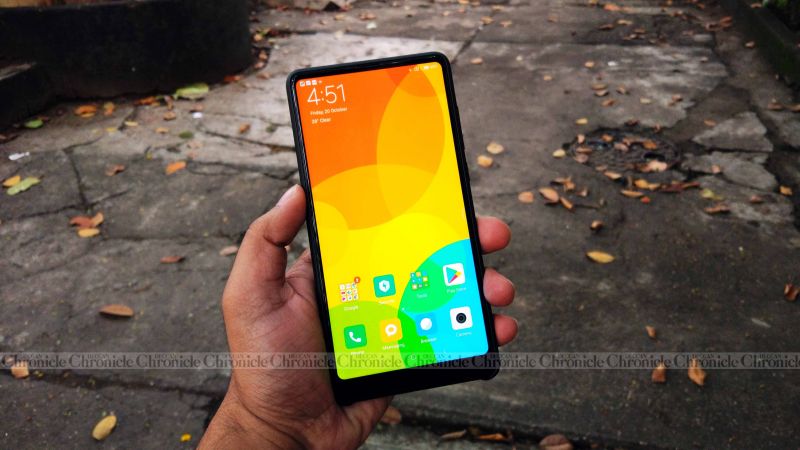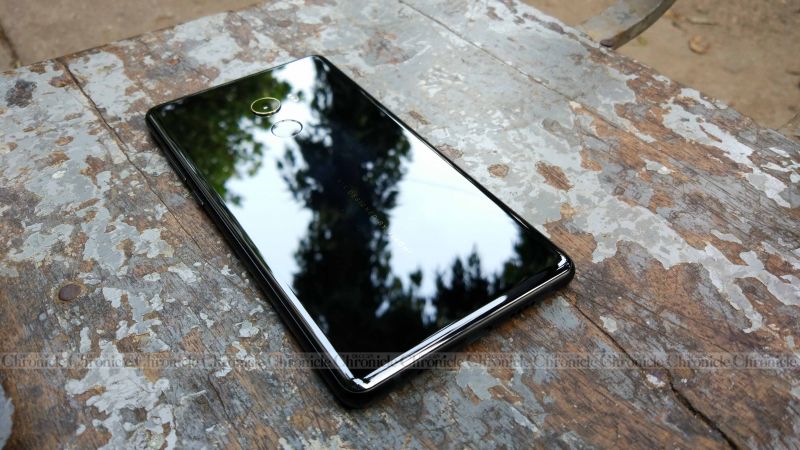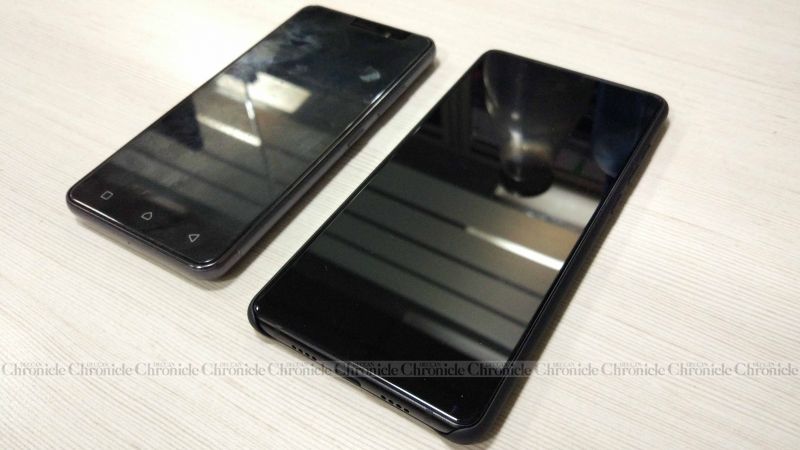Xiaomi Mi MIX 2 review: The torchbearer for bezel-less smartphones
The Xiaomi Mi MIX 2 brings a touch of style and class to affordable flagship smartphones.;

When the original Mi MIX was unveiled before the world as a concept smartphone a year ago all of us assumed it would be a while before our smartphones would lose all of those unnecessary bezels. Fast forward just a year and thin-bezel displays are already encouraging people to upgrade to new and expensive smartphones with narrow bezels.
The iPhone X and the Mi MIX 2 are currently leading the pack of bezel-less smartphones; both with the least amount of bezels one can find on a smartphone. However, the Mi MIX 2 has a lot resting on its shoulders — first is to be the trendsetter for smartphones across all price brackets to shed fat and ugly bezels; and the second is to boost Xiaomi’s image as a premium smartphone manufacturer, i.e. stack it up with the likes of Google, Samsung or even Apple. So, does the premium Xiaomi offering have what it takes to be the segment leader like its more affordable siblings?
There’s no doubt that the Mi MIX 2 is one of the most premium-looking smartphones out there. Sadly, India will only see the standard variant with a metallic frame and a ceramic rear panel, which seems like a perfect recipe for an affordable flagship smartphone from a big brand — the Mi MIX 2’s build takes the comparison to the likes of flagships from Apple and Samsung.
When you pick up a Mi MIX 2, the first thing you would notice is how understated, yet stylish the smartphone comes across as. With the display is switched off, or is in sleep mode, it looks pretty much as any other smartphone out there.
The Mi MIX 2 is indistinguishable from any smartphone with conventional bezels.A display with curved edges, rounded edges on the frame, ceramic rear panel, all-black mirror finish — it's neat. It looks like a slab of glass simply lying on a table. In fact, the Mi MIX 2 is not a smartphone that screams “look-at-me-I-am-the-flagship”.
Notice the tiny earpiece slit above the display.Once you start taking note of the fine details, you will want to appreciate Xiaomi for masking some of the usual technologies of smartphones that don't need to be shown. There’s absolutely no visible earpiece, or proximity sensor, or front camera — but surprisingly they are all right there, staring you in your face, but yet invisible to your eye. All you can 'probably' notice is a notification light and the front camera on the chin.
Turn it around, and you will notice that Xiaomi has also added a touch of class to it by plating the camera's outer rim with 18-carat gold. The 3.5mm headphone jack is sadly absent from the Mi MIX 2 (Xiaomi bundles a USB Type-C to 3.5mm converter with the handset).
As for the earpiece, with the original Mi Mix, Xiaomi had dropped the usual driver-based earpiece speaker with a piezoelectric speaker system that vibrates the display to create the sound you need to hear. However, since that technology was not as efficient as required (the audio volume was not clear and loud enough), Xiaomi has now taken a different approach. They call it the cantilever piezoelectric ceramic acoustic technology, an all-new guided earpiece design that cleverly channels the audio from the speaker using a tunnelling system to route the audio to the earpiece slit that resides between the display and the frame on the top of the smartphone.
In plain English, the earpiece sits under the screen and transmits the audio to the ear by resonating it through a tube as well as onto the upper display area for a better audio quality and volume.
As for the proximity sensor, the standard infrared technology is replaced by an ultrasonic sensor that can stay hidden behind the display and operate through the glass. IR technology required line of sight and hence needed to be visible on the top of the phone, that you see on a conventional smartphone. As for the front camera, Xiaomi has masked it cleverly by using a darker glass over it. You need to carefully look at the bottom corner to locate the camera within. This trick makes the smartphone look like an all-glass front by cleverly hiding the crucial electronics behind the display.
The front camera is barely noticeable, thanks to a dark tinted glass over it.Placing the front camera on the chin makes for an uncomfortable position to take selfies or do a video chat. If you take a selfie in the normal position, the camera takes a photo from a lower angle, and also your palm tends to hinder the camera at most times. To counter this, Xiaomi has specially implemented a feature into the MIUI OS, which rotates the entire UI by 180 degrees so that the front camera now comes to the usual top position. In short, when using the selfie mode, you should use the phone in an upside-down position. This may sound impractical, however, we look at it as genius — the reason because you only need the front camera on the top when you are using it.
Turn on the display and the Mi MIX 2 could make you drool, staring at it for longer periods to see how it simply ends at the border. It’s rather weird to look at a smartphone where the border of the display marks the outline of the phone. The 5.9-inch display has been fit within a 5.5-inch chassis — this covers the entire front area and leaves you with nothing else to look at. A larger display on a smaller width means there's a taller display resolution (18:9) on the Mi MIX 2 as opposed to the standard 16:9 in conventional smartphones. Xiaomi has used an LCD panel with Full HD+ (1080 x 2160 pixels) resolution, having well-rounded corners.
While the display produces vibrant colours, great contrasts and adequate brightness, we expected Xiaomi to opt for an AMOLED panel with 2K resolution — when most new flagships are offering 2K. Do note that not all apps are able to take advantage of the narrow 18:9 display aspect ratio. This would result in black bars on the sides; however, app developers are soon adopting the new display ratio standard and you shall soon see them filling up the display completely.
Since Xiaomi is selling the Mi MIX 2 at a ‘not-expected-by-Xiaomi’ price (Rs 35,999) (pun intended), the company has ensured you get flagship-class specifications with flagship-class performance. However, we still find the price of the smartphone a bit too steep. We expected it to be priced around Rs 30K, targeting its closest contender — the OnePlus 5.
Powering the Mi MIX 2 is a Qualcomm Snapdragon 835 chipset along with 6GB RAM and a graceful 128GB of internal storage. We have seen the Snapdragon 835 perform effortlessly on the HTC U11 and OnePlus 5 which India has seen, and it’s no different here as well. With 6GB RAM, multitasking is a breeze on the Mi MIX 2, with the phone effortlessly able to keep two heavy games and a few social media apps in the RAM. Therefore, it all seems good, but…..(read on)
There’s a very big ‘but’ to the Mi MIX 2’s performance — MIUI. All Xiaomi smartphones (with the exception of the Mi A1) come with MIUI 8 as the proprietary software. We have always appreciated MIUI 8 for its quick reflexes, despite being a heavily customised version of Android. Had this been a sub-Rs 20,000 smartphone, we wouldn’t have pointed fingers at the software. The Mi MIX 2 is a flagship smartphone and we expected Xiaomi to bake in some kind of gimmicks or at least ship it with a newer version of Android (Mi MIX 2 runs Android 7.1 Nougat and sadly still not Oreo) to justify the higher price tag.
But no, it’s the same MIUI 8 that features on the other mid-range smartphones from the same stable. There’s no new wallpaper or even any theme specially created for the gloriously large display. In fact, there’s no way to differentiate between a Redmi Note 4 and the Mi MIX 2 in terms of software (UI). Hey Xiaomi! The Mix 2 lacks that 'new, unique phone' feeling, at least as far as the UI is concerned.
One area where Xiaomi hasn't overdone like the competitors from this price range is the camera. There’s a 12MP Sony IMX386 sensor doing duties for the rear camera. It can capture 4K videos and is aided by a 4-axis Optical Image Stabilisation unit, Phase Detection Auto Focus and some software trickery for low light enhancement. Despite lacking a dual camera setup, we can confirm that the camera captures some impressive details.
In natural daylight, you get good pictures with adequate sharpness, a wide variety of colours, great contrasts and appreciable white balance. However, the colours are a tad punchy and vibrant. When shot in a shadowy area or during low light conditions, the photos tend to pick up grains, but well within the acceptable limits. It might be not as comparably good as an HTC U11 or Galaxy Note 8 in low-light conditions, but you definitely get decent photos, nonetheless.
To keep alive such potent hardware, there’s a 3400mAh battery with the support for Quick Charge 3.0. In a phone that makes its user obsessed with the display, we managed to keep the phone alive for one whole day. Note that we have been streaming a lot of videos on LTE, playing graphics-heavy games, casual texting and a fair bit of video calling, apart from the usual social media and camera stuff. Expect a full battery charge in just above an hour — thanks to the Quick Charge 3.0.
Verdict:
The Mi MIX 2 looks like a lot of smartphone for the price it sells. However, if you minutely look at the offering on paper, there's nothing more than just a tad larger display, a ceramic rear panel and a carefully designed, almost-bezel-less body, apart from the usual SD 835+6GB/128GB internals.
The display is its only primary USP. Despite crafted with premium (and delicate) materials, it has nothing unique over its rivals. However, since the display is unique, the design is great and the internal guts are powerful enough, making this a great gadget to flaunt around. If your budget stands sufficient, we would definitely advise your to opt for one of these babies.
(Also published on Deccan Chronicle)




